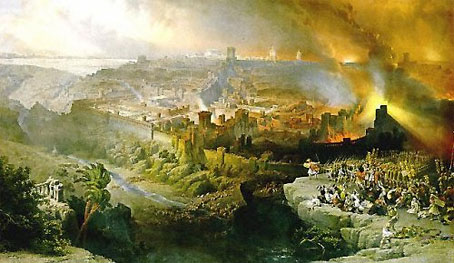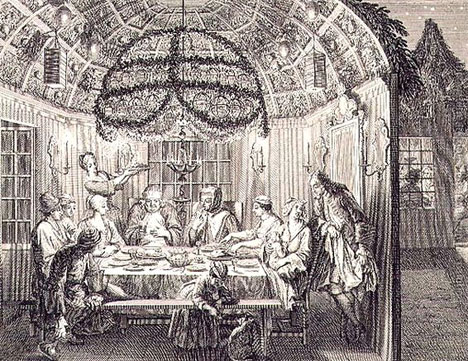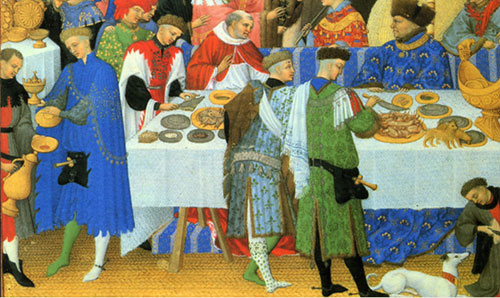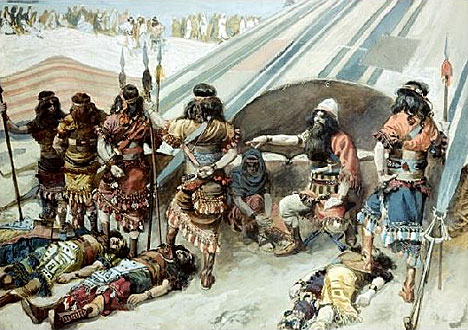Jan
27
2012
or Riffing on Moses

The Lord’s name might not be mentioned explicitly in the book of Esther (though some scholars see it hidden in the text), but as literature it is riddled with riffs on the patterns found in the Law and the Prophets. We don’t see it because we don’t interpret “musically,” that is, looking for recurring themes. [1]
Continue reading
Comments Off | tags: Covenant Theology, Deuteronomy, Esther, Feasts, James Jordan, Literary Structure | posted in Bible Matrix, Biblical Theology, The Restoration Era
Dec
19
2011

The systematic typology of the Bible Matrix allows us to follow the structures of the Torah thoughout the rest of the Bible. Here’s something that links the Restoration era with the book of Deuteronomy.
Continue reading
Comments Off | tags: Baptism, Deuteronomy, Esther, Exodus, James Jordan, Jeremiah, Mordecai, Moses, Systematic typology, Tabernacle, Ten Commandments, The Law | posted in Biblical Theology, Quotes, The Restoration Era
Aug
2
2011

Doug Wilson writes:
“Why do baptists not understand the covenant? The answer is not what many paedobaptists want to hear — the baptists do not understand it because paedobaptists do not understand it” (To a Thousand Generations, p. 95).
In context, Pastor Wilson’s argument here seems to be that if the church is suffering from nominalism, paedobaptism is not to blame.
Continue reading
Comments Off | tags: Baptism, Covenant Theology, Deuteronomy, Doug Wilson | posted in Bible Matrix, Biblical Theology
Jun
2
2011

Doug Wilson writes:
“The Levitical administration brought strong curses for disobedience (Heb. 2:2-3); the New Covenant administration brings much greater curses (Heb. 10:29; Heb. 12:25). Christians commonly assume that the really terrifying curses for disobedience were given in the Old Testament, and that under the New Testament all is grace. But this is precisely the opposite of the New Testament’s teaching on the subject” (To a Thousand Generations, pp. 28-29).
This is certainly a side of the New Covenant that Christians are never taught. The first time I ever heard of it was in David Chilton’s Revelation commentary The Days of Vengeance in 1989. But along with baptism (just had to throw that in), a rediscovery of the Old Covenant hammer makes everything in the New Covenant look like a nail. The Revelation is, after all, a book about the end of the Old Covenant.
Continue reading
Comments Off | tags: Baptism, Covenant curse, Covenant Theology, David Chilton, Deuteronomy, Doug Wilson, Hebrews, Josephus, Leviticus, Revelation 20 | posted in Against Hyperpreterism, Biblical Theology, The Last Days
Apr
6
2011

“…how we feast and celebrate is a reflection of our beliefs concerning the salvation of the world.”
Sermon Notes on Deuteronomy 14:22-29 – Part 3
Guest post by Michael Shover
Gathering Clouds
There is another aspect to the Feast of Booths that we need to take into consideration. The sacrifices. During the Feast of Booths, 70 bulls were sacrificed. 13 on the first day, 12 on the second, 11 on the third, 10 on the fourth, 9 on the fifth, 8 on the sixth, 7 on the seventh which equals 70. Then 1 on the last day. Why 70? What is the significance of the number 70? The 70 bulls represented the 70 nations of the world as outlined in Gen. 10. The 1 bull that was sacrificed on the eighth day represented Israel. The 70 bull sacrifices represented the ingathering and atonement for the 70 nations of the world. Salvation was accomplished by Israel for all the nations.
Continue reading
2 comments | tags: Deuteronomy, Genesis, Tabernacles | posted in Biblical Theology
Apr
4
2011

“…how we feast and celebrate is a reflection of our beliefs concerning the salvation of the world.”
Sermon Notes on Deuteronomy 14:22-29 – Part 2
Guest post by Michael Shover
The Garden City
According to Leviticus 23 the Feast of Booths, or The Feast as it was later called, was an eight day celebration.
Continue reading
1 comment | tags: Deuteronomy, Exodus, New Jerusalem, Revelation, Tabernacles | posted in Biblical Theology
Apr
1
2011

“…how we feast and celebrate is a reflection of our beliefs concerning the salvation of the world.”
Sermon Notes on Deuteronomy 14:22-29 – Part 1
Guest post by Michael Shover
Feasting, the Heart of Evangelism
It has been one of the most unfortunate developments in the history of the Church that we have gotten away from and have forgotten the Biblical mandate to feast before the Lord. We so often lead lives that are shallow in piety and so consuming in busyness that we become forgetful, nay even neglectful of the fact that our God commands such things as, “And you shall spend that money for whatever your heart desires: for oxen or sheep, for wine or strong drink, for whatever your heart desires; you shall eat there before the LORD your God, and you shall rejoice, you and your household.”
Continue reading
Comments Off | tags: Church History, Deuteronomy, Ecclesiology, Evangelism, Feasts, Tabernacles | posted in Biblical Theology, Christian Life
Mar
23
2011

A blog post from my friend Albert Garlando, republished here with his permission.
Marriage, Divorce and the Gospel
Jesus is interrogated by the religious ‘mob’ concerning his views on divorce (Mark 10:1-12). The mob are trying to get him to make a call on the Old Testament (Deuteronomy 24:1-4) provision for divorce and remarriage. The 1st Century rabbis did not agree in their own interpretations of this, so they pestered Jesus about it.
Their big question was: “What makes divorce OK?”
True to form, Jesus’ response is, “You have missed the point and are asking the wrong question.”
Continue reading
Comments Off | tags: Albert Garlando, Deuteronomy, Divorce, Herod, John the Baptist, Marriage | posted in Biblical Theology, Christian Life, Quotes
Mar
17
2011

or OH&S in Eden
I mentioned in a post the other day that silver is bridal, and that silver was relegated to the tent poles, the outer court, until the Tabernacle died, was resurrected and transfigured into the Temple of Solomon. [1] The reason was that the Sanctuary was the King’s Court, a place that was not safe for criminals. It demanded that justice be satisfied with a constant presentation of fresh blood.
Continue reading
Comments Off | tags: Baptism, Circumcision, Deuteronomy, Genesis, Joshua, Resurrection, Silver, Solomon, Tabernacle, Table of Showbread, Temple | posted in Biblical Theology, Creation


































